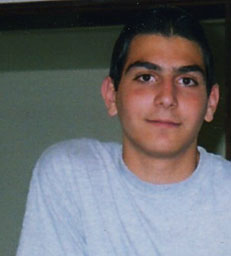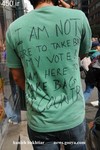The Death March
by HADI GHAEMI in New York
15 Oct 2009 07:183 Comments
 [ analysis ] Iran's post-election turmoil and the ensuing human rights crisis entered a new phase this week, after authorities announced death sentences for four defendants following the mass trials held for more than a hundred people accused of fomenting unrest and challenging the election results. It has raised the specter of further political executions in Iran. Most ominously, the death sentences were announced on October 10th, the International Day Against the Death Penalty. On the same day, Iran put to death Behnoud Shojaii, a juvenile offender, continuing Iran's distinction as the only country to execute juvenile offenders since 2008.
[ analysis ] Iran's post-election turmoil and the ensuing human rights crisis entered a new phase this week, after authorities announced death sentences for four defendants following the mass trials held for more than a hundred people accused of fomenting unrest and challenging the election results. It has raised the specter of further political executions in Iran. Most ominously, the death sentences were announced on October 10th, the International Day Against the Death Penalty. On the same day, Iran put to death Behnoud Shojaii, a juvenile offender, continuing Iran's distinction as the only country to execute juvenile offenders since 2008.
The harsh sentences signaled a determination by the Revolutionary Guard commanders and hard-line supporters of Mahmoud Ahmadinejad to extend their consolidation of power to the judicial branch. Since the eruption of popular protests challenging the election results, Revolutionary Guards commanders together with Friday prayer leaders and their political allies have been beating the drums for a severe response from the Judiciary, arguing that defendants should be charged with Moharebeh (taking up arms against God) which is punishable by death under Iranian laws, and calling for this ultimate penalty.
More than a hundred detainees have been on trial for the past two months in what have been widely condemned by human rights organizations as "show trials" without minimal adherence to standards of due process and fair trials. The defendants are a mixture of well-known personalities, regular street protesters, and a small group who were detained before the election and accused of connections with opposition groups.
The inclusion of the latter group, arrested in April 2009, well before the June 12 election, in trials connected with post-election unrest has been somewhat of a mystery until now. The first set of death sentences was issued against this group, which includes three people accused of having communications with a small pro-Monarchist group known as Anjoman Padeshahi Iran and one person accused of making contacts with the Mojahedin-e Khalq Organization.
It appears the prosecutor intentionally threw these cases in among the post-election defendants to establish a precedent for bringing the charge of Moharebeh in the mass indictments. By condemning these four defendants to death, the Judiciary has set the stage for justifying further execution sentences against ordinary protesters as well as well known politicians, journalists, and dissidents who are also on trial.
The four defendants sentenced to death are not guilty of any violent actions and their indictments clearly state that the Intelligence Ministry arrested them "before they could engage in any action." Even under the existing laws, they could not be sentenced to death in fair trials. However, by using them as a front in a public relations ploy to justify death sentences in post-election trials, the government is pursuing two goals. First, the government is aiming to instill fear among reform-oriented Iranians, and raising the cost of participation in further protests, by signaling its power and determination to apply the death penalty at will. The second intent is to lay the groundwork for further political executions by desensitizing the broader population to state-sponsored violence.
Serious concerns about a possible wave of political executions are rooted in Iran's recent history and the Islamic Republic's dark track record. The government is domestically weak and faces many political challenges from within. On the international front, it appears to be moving fast in nuclear negotiations with P5+1 and drawing legitimacy from this process.
For the nuclear negotiations to move forward, Ahmadinejad's government must make serious concessions that will be hard to justify domestically in the face of constant hardline rhetoric to the contrary. The situation is reminiscent of the end of the Iran-Iraq war in 1988, when the Iranian government could no longer sustain its war effort and was forced to accept UN resolutions calling for a cease-fire, a process Ayatalloh Khomeini compared to "drinking the cup of poison." Immediately after Iran accepted the ceasefire in 1988, the government engaged in mass executions of at least 4500 political prisoners who were already prosecuted, serving their sentences, and not charged with capital crimes.
Once again, following a highly disputed election and domestic brutality that has offended important members of the ruling class, the government is facing serious challenges from within, yet in need of accepting international demands it has boasted about resisting. The specter of a large number of political executions could be the coarse and brutal policy of the state to keep its restive population in check.
The Iranian justice system is seriously flawed with regard to its application of death penalty. As UN High Commissioner for Human Rights, Navi Pillay, observed on October 13 in protesting recent death sentences in Iran, "Under international law, the death penalty can only be applied when very strict conditions are met, for example only in respect of the most serious crimes and only after scrupulously fair trials."
Iranian courts can hardly be characterized as providing access to justice through fair trials. Iran executes more people in absolute terms than any other country except China. Since Ahmadenejad took office in 2005, the number of executions has increased fourfold: in 2005, 86 people were put to death and in 2008 the number of executions skyrocketed to at least 346.
In only 50 days following the disputed June 12 presidential elections, 115 persons were executed in Iran, although the authorities have disclosed almost no information about who they were, or the crimes for which they were convicted.
In addition, since 2008, Iran has been the only country to implement death sentences for juvenile offenders, persons accused of committing a crime under the age of eighteen. There are at least 130 juvenile offenders on the death row in Iran.
The international community's focus on the nuclear issue and the P5+1 negotiations with Iran are taking place against a backdrop of serious human rights crimes in Iran. The Obama administration is so enthralled by the possibility of finally getting Iran to the negotiation table and extracting concessions, that it is all but ignoring the human rights crisis, the post-election violence, and now the rising number of political death sentences. It is a folly to consider the nuclear negotiations and human rights concerns as mutually exclusive. They are indeed inter-related as state-sponsored violence and human rights violations are closely interwoven into Iran's foreign policy calculations at the moment. It remains to be seen if Iran has indeed achieved a form of nuclear deterrence--if, by having even appeared to join the nuclear club, it will be immune from pressure about human rights.
Hadi Ghaemi is the director of the International Campaign for Human Rights in Iran.































3 Comments
Emphasizing international relations in the 1988 purge is something of a convenience, in order to make a political point with reference to the current nuclear negotiations. For what it's worth, I really doubt the Iranian government will give up its right to mastery of the fuel cycle, but we'll just have to see.
I definitely see that Iran's judicial system is weak and in need of improvement. While I do not condone the extra-legal proceedings that appear to be taking place, in the context of the 1980 and 1988 purges, I see the potential for a more moderate approach being taken, or at least more limited in scope, than previous such episodes.
I'm also not a supporter of the death penalty in the United States, nor do I support "supermax" conditions for young people, Guantanimo, Bagram, Abu Ghraib, civilian victims of aerial bombardment, etc. That said, I don't think these US human rights abuses should prevent the Islamic Republic of Iran from engaging in negotiations with the United States of America.
Pirouz / October 15, 2009 9:14 AM"state-sponsored violence and human rights violations are closely interwoven into Iran's foreign policy calculations at the moment."
Yes, and those calculations mean making a deal with the US to guarantee regime survival.
The mistake the US is making in dealing with Ahmadinejad's militaristic hardline government is that the US will have to continue dealing with them for time to come. Down the line, the term for it is 'blow back' - to US interests in the region, which Iran will continue to undermine, as soon as the regime re-consolidates power, a process which the US is helping to cement.
taliya / October 15, 2009 10:39 AM@Pirouz
You can't compare Abu Ghraib and Guantanamo Bay to Evin and Kahrizak. In Iran, young Iranian men and women are being tortured, raped and murdered by other Iranians because of their political beliefs. You also can't claim that the death of 72 people, the imprisonment of hundreds more and the mass Stalinist trails are a "more moderate approach". How generous of you!
Your thinly veiled attempt to legitimise the regime's oppression of its own people is disappointing. It reminds me of how, in spite of the crimes this regime has committed, there are still people who are willing to support it. If you are getting agitated by the increasing opposition then you can only blame yourself as your narrow minded views only encourage them more.
Sam / October 16, 2009 6:31 AM